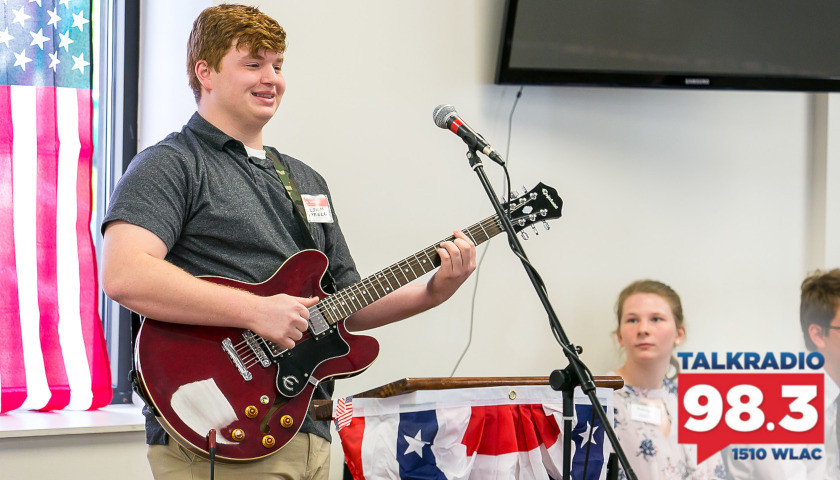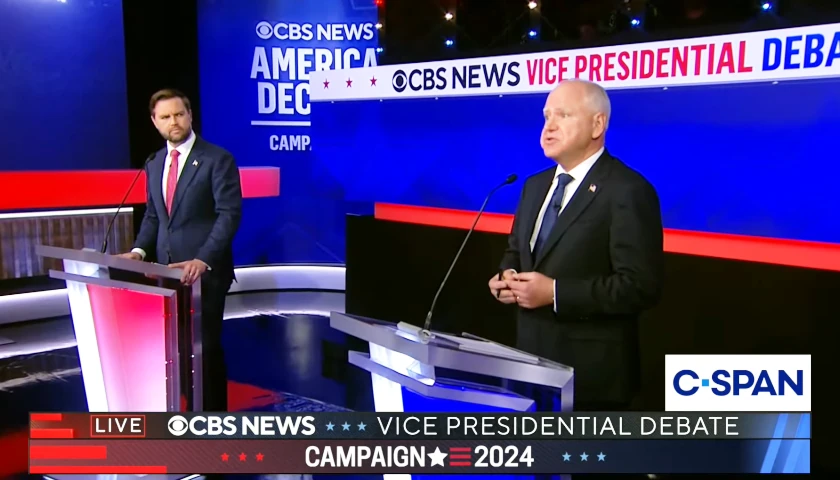Live from Music Row Thursday morning on The Tennessee Star Report with Michael Patrick Leahy – broadcast on Nashville’s Talk Radio 98.3 and 1510 WLAC weekdays from 5:00 a.m. to 8:00 a.m. – host Leahy welcomed Executive Director of The National Constitution Bee Claudia Henneberry in studio to outline the procedure of the National Constitution Bee on October 23rd.
Leahy: Our guest in the studio. This is one of my favorite segments ever that we’ve ever done on this program. Our executive director of the National Constitution Bee, Claudia Henneberry. Claudia has worked as a labor of love for four years on The Constitution Bee.
And now we’ve finally been able to hire to be the executive director of the National Constitution Bee. It will be held Saturday, October 23rd. Doors open at 8:00 a.m. at the Springhill Suites by Marriott.
Henneberry: Good job.
Leahy: Thank you. I’ve got standard to hit of accuracy. And so now kids are in. They’re registered. We think there’ll be 25. Maybe there’ll be 50 kids. The winner gets a $10,000 check that day as an educational scholarship, second place $5,000. 3rd place $2,500.
Now set the stage. What happens at the very beginning of this competition? Where are the kids? There’s an audience there. How does it work?
Henneberry: Once the kids are settled and they are seated in the front of the room in their chairs, individual chairs. And we have them come up one at a time. Let’s go back to the beginning. In the beginning, we have a presentation.
The kids can choose to do so or not to do so. They can present in a very creative manner. The Preamble. A lot of our students sing The Preamble.
Leahy: The Preamble to the United States Constitution.
Henneberry: We the people. And they can creatively sing. They can creatively present by any means that they deem fun and entertaining.
Leahy: It’s optional, but it’s kind of loosen things up. And we give three awards away. The most creative presentation of the preamble, the most persuasive presentation, and the most entertaining. We’ve got little trophies we give away.
Just to remind people, this is chapter three in the book, which you co-authored with me and John Harris. Guide to the Constitution and Bill of Rights for Secondary School Students. Let’s just go over it. Written by Gouverneur Morris.
Henneberry: Gouverneur. (Chuckles)
Leahy: Here it is.
We the people of the United States in order to form a more perfect Union, establish justice, insure domestic tranquility, provide for the common defense, promote the general welfare, and secure the Blessings of Liberty for ourselves and our posterity do ordain and establish this Constitution for the United States of America.
Henneberry: Gouverneur doesn’t get enough credit.
Leahy: He does not. Now the kids again, it’s optional. And about half the kids, maybe two-thirds of the kids to say, yeah, I’ll do this. What have been the most interesting preamble presentations that have been made by kids so far last year?
Henneberry: I absolutely adored the young man from Illinois. He played his guitar. He wrote an original song.
Leahy: Oh yeah.
Henneberry: I’m not sure if it was completely the way that the preamble is written in the book. I think that he just made up his words and he was a wonderful singer.
And his family were just so incredibly overwhelmed and proud. They should have been. I think we actually doled out a little bit of money because he was so entertaining.
Leahy: He was so good. We’re probably going to give a little bit of prize money, like a couple of $100 or maybe more for those three awards. But it is fun.
The kids are so creative in the way that one person, they sing it, they dance it. One did it in a rap version. One did it in Spanish.
Henneberry: En Espanol.
Leahy: Nobody’s done it in any other language yet, but who knows? Right?
Henneberry: We can’t wait.
Leahy: The kids can do it however they want to.
Henneberry: And that’s a lot of fun. It’s an icebreaker. The kids get to show off their talents. And then, of course, we start into the questions a very serious part. We have level one questions, which I’ve written all the questions.
Leahy: Now let me just say for the audience, you’ve gone over the book and you have broken down because you’re a teacher and you know how to do this thing.
Henneberry: I do.
Leahy: You have broken down into three or four levels of difficulty. How many levels of difficulty are there?
Henneberry: Four levels, all total.
Leahy: Each one is more difficult. But we start with level one, right?
Henneberry: Right. Level one. And then the kids come up one at a time to the microphone. They get to see the screen with the question displayed, and then they answer.
I can’t reveal too much about my questions right now, but they answer the question, and if they get it correct, they proceed to the same area where they came from their seat. And then when it’s their turn again, they’ll get a chance to answer another question.
Leahy: Now in the first two rounds, what happens if a kid gets the first question wrong? What do they do?
Henneberry: You are the MC. So you have sort of created in your mind, go to the friends of the court in the little sitting, a little play area, the opposite area from the other kids who have gotten the questions correct.
Leahy: But in the first round, we give them a bonus question. An opportunity to get back in the competition.
Henneberry: A chance to get back in. And we’ve had several of our students who do get back into the competition.
Leahy: Actually, I think we had one time the champion got back in. I think we had one of the times.
Henneberry: I think so. I think you’re correct about that.
Leahy: But here’s what’s interesting about it. The dynamics of this with the other kids is you would think, I want to win, but they actually they cheer. They try to help the other kids.
Henneberry: They do. And that’s when the friends of the court come in. I think we have had a lot of students to weigh in and help their fellow students, whether they know them or not, whether they’re from the same school or not.
Leahy: So what will happen is let’s just say in the first round, you get a question wrong, you get the opportunity to get back in and we do that for two rounds.
And then after that, when the questions get a little harder and you miss a question, you go into the friends of the court area, but you’re out of the individual championship. We actually had somebody that was so good in the Friends of Court last year, we gave them a scholarship.
Henneberry: A young lady.
Leahy: She was so good. The way the rules work on this is you have a situation where they have a chance. If you’re asking somebody up there the question and they don’t know the answer, they can ask a friend for help.
Henneberry: Sort of like what was that show?
Leahy: So You Want to Be a Millionaire. So this is a difficult question. You’re not really sure. And so what happens then, is they’re up there, would you like to ask a friend?
And you say yes. And then the kids that are out of the direct competition, they can actually put their hands up and say, I know the answer.
Henneberry: And that’s your bag, Michael. That’s what you do. You’re good at doing your MC thing. And it’s not necessarily you create the rules as we go on. But it’s sort of like that with you. But then we go through level two.
Then we get to level three a little bit harder questions. The students go on through all of that one at a time, and some are eliminated because they’ve missed a couple of questions.
Then my favorite part, unless we have a special guest this year. We might have that special guest between level one and level two and level three questions. But we don’t know if Alan is going to come back or not to
Leahy: Alan Dershowitz.
Henneberry: Yes.
Leahy: We have an invitation to him.
Henneberry: Excellent.
Leahy: Actually he told us he’ll come down when the COVID is over. Obviously, he’s not coming down this year. He’s up on Martha’s Vineyard hanging out.
Henneberry: Wow. They let him go back there? (Leahy chuckles)
Leahy: So my favorite part, however, in this Constitution Bee, is this essay part. So now what happens is over the rounds of questions, we end up with about six kids of the 25 depending. And then we take a break and then they get essay questions. This is where the judges come in.
Henneberry: This is basically where the judges start besides the fact that we’ve already judged the presentation of the preamble.
Leahy: So you’re quite right about that. The kids are given essay questions and then they come back and then each of them has what is it three minutes.
Henneberry: They choose their essay question. They choose their essay question. They have 30 minutes to prepare in a very cool soundproof room, and we monitor their experience in there. We monitor their writing.
They get to write one piece of paper or two and a pen or a pencil, and they write their essay answer. And they come back in. They have about two minutes to present.
And once they’ve done that, the judges have already made up our minds pretty much. But it’s a very fast process for the judges. We have to be ready.
Leahy: Well, we’ll talk about how you pick the best essay and what happens after that. We’re listening. I’m on the edge of my seat to hear how this works out.
– – –
Tune in weekdays from 5:00 – 8:00 a.m. to the Tennessee Star Report with Michael Patrick Leahy on Talk Radio 98.3 FM WLAC 1510. Listen online at iHeart Radio.





